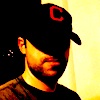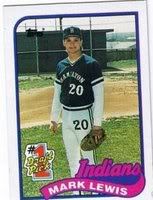Indians  Indians Archive
Indians Archive  Ghosts Of Prospects Past: Mark Lewis
Ghosts Of Prospects Past: Mark Lewis
 Indians Archive
Indians Archive  Ghosts Of Prospects Past: Mark Lewis
Ghosts Of Prospects Past: Mark Lewis
Written by
Andrew Clayman
 New installment we debut today called "Ghosts Of Prospects Past", by Andrew Clayman ... a look back at some of the greatest prospects in Indians history, some who excelled, and some who were busts. Since we're fresh off the amateur draft, it only seems fitting to start our time traveling series with a look back at one of the Tribe's most highly touted draft picks of all-time - the Brady Quinn of his day - Mark Lewis. Enjoy.
New installment we debut today called "Ghosts Of Prospects Past", by Andrew Clayman ... a look back at some of the greatest prospects in Indians history, some who excelled, and some who were busts. Since we're fresh off the amateur draft, it only seems fitting to start our time traveling series with a look back at one of the Tribe's most highly touted draft picks of all-time - the Brady Quinn of his day - Mark Lewis. Enjoy.
 Hello and welcome to the first edition of "Ghosts of Prospects Past" - the only TCF column that favors hindsight over foresight. Tapping into my irrational nostalgia for obscure roster moves and forgotten future stars, I'll be helping to shed a little light on the current Indians by looking at where they've gone wrong-and right-in the past. After all, before any of us skewer Mark Shapiro for dealing Cliff Lee for a bunch of prospects, it might help to remember how Cliff Lee got here in the first place (Bartolo Colon trade, 2002).
Hello and welcome to the first edition of "Ghosts of Prospects Past" - the only TCF column that favors hindsight over foresight. Tapping into my irrational nostalgia for obscure roster moves and forgotten future stars, I'll be helping to shed a little light on the current Indians by looking at where they've gone wrong-and right-in the past. After all, before any of us skewer Mark Shapiro for dealing Cliff Lee for a bunch of prospects, it might help to remember how Cliff Lee got here in the first place (Bartolo Colon trade, 2002).
Since we're fresh off the amateur draft, it only seems fitting to start our time traveling series with a look back at one of the Tribe's most highly touted draft picks of all-time - the Brady Quinn of his day - Mark Lewis.
Following the Sports Illustrated cursed season of 1987, the Indians brought in GM/President Hank Peters to try and breathe some life into the franchise. In his first draft on the job in 1988, Peters selected the baby-faced Mark Lewis out of Hamilton, Ohio, with the #2 pick overall. Instantly, Lewis became the Indians' savior in-waiting-a slick fielding, potential batting champ who could deliver some much needed OBP to a line-up populated by Joe Carter, Cory Snyder, Brook Jacoby, and Mel Hall. So highly regarded was Lewis, in fact, that Peters came to feel that his other major shortstop prospect, Jay Bell, was now expendable. At the end of the 1988 season--despite the fact that Lewis had only hit .264 in 61 games at Burlington-- Peters dealt Bell to Pittsburgh for light hitting Felix Fermin (Bell went on to play in a couple All-Star Games). The plan was for Fermin to keep the shortstop spot warm for Lewis, but in the long run, it would take five more years and a guy named Omar to bring Fermin's placeholder run to an end.
Unlike some top prospects who excel in the Minors only to flop under the bright lights of the Big Show, Lewis never really realized his potential at any level. Drafted at the age of 18, he never hit .300 in the Minors, and despite reaching Cleveland for the second half of the 1991 campaign, he would continue bouncing up and down from AAA for the next four years. His best season in a Tribe uniform was 1992, when he played in 122 games and hit .264 with 5 HRS and 30 RBIs-Enrique Wilson production.
To Lewis' credit, he did eventually find his niche, however briefly, as a journeyman middle infielder. After making history as the final out in the final game at Municipal Stadium in 1993, he was traded the following season to the Reds for Tim Costo (another forgotten future star). From there, it was a string of one-year contracts for Lewis, logging part-time duty in Cincinnati, Detroit, San Francisco, Philadelphia, and Baltimore. He actually hit .339 in half a season with the Reds in 1995, and followed that up with a solid 1996 campaign with the Tigers: .270, 11 HRS, 55 RBIs. Appropriately, though, Lewis' career came to a close back where it started, tallying 1 hit in 13 at-bats for the 2001 Indians. After the club sent him back to Buffalo that season, he would never smell the Big Leagues again.
Lewis finished up with a career average of .263. No batting titles. No votes for the Hall of Fame. And of course, no World Series rings. Here's hoping Alex White's future proves rosier.
 Hello and welcome to the first edition of "Ghosts of Prospects Past" - the only TCF column that favors hindsight over foresight. Tapping into my irrational nostalgia for obscure roster moves and forgotten future stars, I'll be helping to shed a little light on the current Indians by looking at where they've gone wrong-and right-in the past. After all, before any of us skewer Mark Shapiro for dealing Cliff Lee for a bunch of prospects, it might help to remember how Cliff Lee got here in the first place (Bartolo Colon trade, 2002).
Hello and welcome to the first edition of "Ghosts of Prospects Past" - the only TCF column that favors hindsight over foresight. Tapping into my irrational nostalgia for obscure roster moves and forgotten future stars, I'll be helping to shed a little light on the current Indians by looking at where they've gone wrong-and right-in the past. After all, before any of us skewer Mark Shapiro for dealing Cliff Lee for a bunch of prospects, it might help to remember how Cliff Lee got here in the first place (Bartolo Colon trade, 2002).Since we're fresh off the amateur draft, it only seems fitting to start our time traveling series with a look back at one of the Tribe's most highly touted draft picks of all-time - the Brady Quinn of his day - Mark Lewis.
Following the Sports Illustrated cursed season of 1987, the Indians brought in GM/President Hank Peters to try and breathe some life into the franchise. In his first draft on the job in 1988, Peters selected the baby-faced Mark Lewis out of Hamilton, Ohio, with the #2 pick overall. Instantly, Lewis became the Indians' savior in-waiting-a slick fielding, potential batting champ who could deliver some much needed OBP to a line-up populated by Joe Carter, Cory Snyder, Brook Jacoby, and Mel Hall. So highly regarded was Lewis, in fact, that Peters came to feel that his other major shortstop prospect, Jay Bell, was now expendable. At the end of the 1988 season--despite the fact that Lewis had only hit .264 in 61 games at Burlington-- Peters dealt Bell to Pittsburgh for light hitting Felix Fermin (Bell went on to play in a couple All-Star Games). The plan was for Fermin to keep the shortstop spot warm for Lewis, but in the long run, it would take five more years and a guy named Omar to bring Fermin's placeholder run to an end.
Unlike some top prospects who excel in the Minors only to flop under the bright lights of the Big Show, Lewis never really realized his potential at any level. Drafted at the age of 18, he never hit .300 in the Minors, and despite reaching Cleveland for the second half of the 1991 campaign, he would continue bouncing up and down from AAA for the next four years. His best season in a Tribe uniform was 1992, when he played in 122 games and hit .264 with 5 HRS and 30 RBIs-Enrique Wilson production.
To Lewis' credit, he did eventually find his niche, however briefly, as a journeyman middle infielder. After making history as the final out in the final game at Municipal Stadium in 1993, he was traded the following season to the Reds for Tim Costo (another forgotten future star). From there, it was a string of one-year contracts for Lewis, logging part-time duty in Cincinnati, Detroit, San Francisco, Philadelphia, and Baltimore. He actually hit .339 in half a season with the Reds in 1995, and followed that up with a solid 1996 campaign with the Tigers: .270, 11 HRS, 55 RBIs. Appropriately, though, Lewis' career came to a close back where it started, tallying 1 hit in 13 at-bats for the 2001 Indians. After the club sent him back to Buffalo that season, he would never smell the Big Leagues again.
Lewis finished up with a career average of .263. No batting titles. No votes for the Hall of Fame. And of course, no World Series rings. Here's hoping Alex White's future proves rosier.
Posted by
Andrew Clayman
Jun 22, 2009 7:00 PM
- NBA Announces 2013-2014 Schedule
- Browns Ink Sharknado
- Sharknado A No-Show For Rookie Camp
- Trent Richardson Out Until Training Camp
- Browns Sign Brandon Jackson
- Carrasco Suspended Eight Games
- Browns Add to Wide Receiver Depth with David Nelson
- Browns Need to Learn from Past Draft Mistakes
- Browns Release Chris Gocong and Usama Young
- Browns Missing on Grimes Disappointing, But Not The End
The TCF Forums
- Official- Browns Coach Search/Rumors
Nicastro13 (Tuesday, January 21 2014 11:45 AM) - Chris Grant's first 3 drafts
Kingpin74 (Tuesday, January 21 2014 10:13 AM) - The 2014 Offseason Thread
googleeph2 (Tuesday, January 21 2014 9:36 AM) - 2015 Recruiting
furls (Tuesday, January 21 2014 6:57 AM) - Mike Brown
YahooFanChicago (Monday, January 20 2014 11:15 PM) - Movies coming out
HoodooMan (Monday, January 20 2014 9:34 PM) - 2014 Hoops Hockey Hijinx
jpd1224 (Monday, January 20 2014 4:44 PM) - 2014 Recruiting
jclvd_23 (Monday, January 20 2014 2:26 PM) - Wish List - #4 Pick
Hikohadon (Monday, January 20 2014 1:26 PM) - #1 overall pick Anthony Bennett
TouchEmAllTime (Sunday, January 19 2014 1:28 PM)


